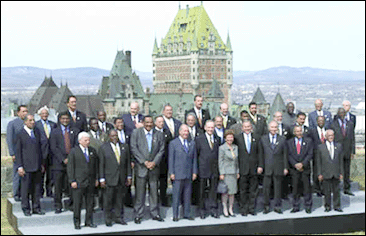Warm up
Questions
- What position did the anti-free trade protesters hold? What claims did they have?
- What did the author think of the protesters on the matter of free trade?
- What might be the lesson for Europeans from the Quebec trade summit?
- What did the author think of free market economy and free trade?
Background
The author
The author, Aaron Lucas, is a policy analyst with Cato's Center for Trade Policy Studies. His research interests include trade sanctions, electronic commerce, and the WTO. His writings have appeared in The Wall Street Journal, USA Today, The New York Times, Investor's Business Daily, and elsewhere, besides for the Cato Institute. He is a frequent commentator on television, radio and on public assemblies. Lucas received his bachelor's degree in political science from Texas A&M University and master's degree in international economics from the Elliot School of International Affairs at The George Washington University.
The Summit of the Americas
The Summits of the Americas are periodic meetings that bring together the thirty-four democratically elected Heads of State and Government of the Americas to discuss and make decisions on issues of relevance for the region.
Six Summits of the Americas have taken place:
* First Summit of the Americas, Miami, Florida, December 9-11, 1994
* Summit of the Americas on Sustainable Development, Santa Cruz de la Sierra,
Bolivia, December 7-8, 1996
* Second Summit of the Americas, Santiago, Chile, April 18-19, 1998
* Third Summit of the Americas, Quebec City, Canada, April 20-22, 2001
* Special Summit of the Americas, Monterrey, Nuevo Le┏n, Mexico, January 12-13,
2004
* Fourth Summit of the Americas, Mar del Plata, Argentina, November 4-5, 2005
The main objective of the Summits of the Americas Process is to analyze and discuss the problems and challenges that the Americas face in order to jointly seek solutions and improve the quality of life of the citizens of the Americas. The Summits of the Americas Process is a "commitment to hemispheric integration and national and collective responsibility for improving the economic well-being and security of our people" (Quebec City Declaration).
The Quebec Trade Summit
The Third Summit of the Americas, held in Quebec City, Canada in 2001, recognized the central role of the OAS in the support of this process (process sought to gather experiences, develop a common language, and create consensus on mandates for collective actions on topics of regional interest). It also recognized the critical job performed by the Special Committee in Inter-American Summits Management (CEGCI) in the coordination of OAS efforts in Summits administration and in providing a forum for civil society contributions to the Summits of the Americas.

The Summit of the Americas Quebec City- Canada- 2001
The Organization of American States (OAS)
On April 30, 1948, 21 nations of the hemisphere met in Bogot│, Colombia, to adopt the Charter of the Organization of American States (OAS), which affirmed their commitment to common goals and respect for each nation's sovereignty. Since then, the OAS has expanded to include the nations of the English-speaking Caribbean, as well as Canada. The Organization of American States (OAS) brings together the nations of the Western Hemisphere to strengthen cooperation on democratic values, defend common interests and debate the major issues facing the region and the world. The OAS is the region's principal multilateral forum for strengthening democracy, promoting human rights, and confronting shared problems such as poverty, terrorism, illegal drugs and corruption. It plays a leading role in carrying out mandates established by the hemisphere's leaders through the Summits of the Americas.
Trade barrier
A trade barrier is a general term that describes any government policy or regulation that restricts international trade or makes it impossible. The barriers can take many forms, including:
, Import duties
, Import licenses
, Export licenses
, Import quotas
, Tariffs
, Subsidies
, Non-tariff barriers to trade
, Voluntary Export Restraints
, Local Content Requirements
Most trade barriers work on the same principle: the imposition of some sort of cost on trade that raises the price of the traded products. If two or more nations repeatedly use trade barriers against each other, then a trade war results.
Trade sanction
Trade sanctions are trade penalties imposed by one or more countries on one or more other countries. Typically the sanctions take the form of import tariffs (duties), licensing schemes or other administrative hurdles. They tend to arise in the context of an unresolved trade or policy dispute, such as a disagreement about the fairness of some policy affecting international trade.
For example, one country may conclude that another is unfairly subsidising exports of one or more products, or unfairly protecting some sector from competition (from imported goods or services). The first country may retaliate by imposing import duties, or some other sanction, on goods or services from the second.
Trade sanctions are distinguished from economic sanctions, which are used as a punitive measure in international relations (examples being recent US or multilateral sanctions against Cuba, Iraq, or North Korea).

